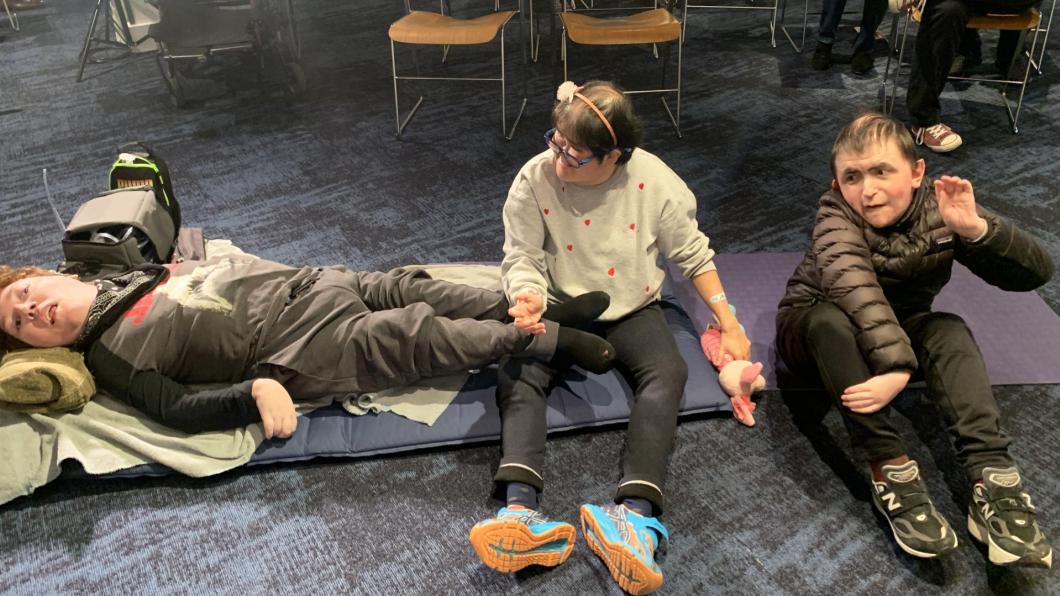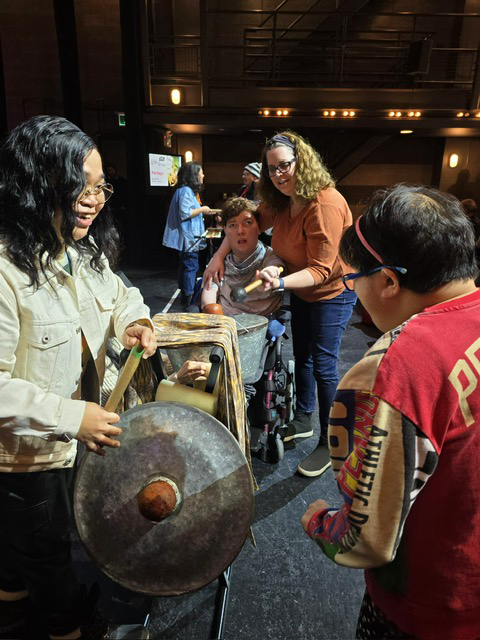
A concert where disabled attendees can be themselves
By Louise Kinross
Going to a concert is associated with a strict behaviour code. You sit still in your seat and remain silent—until it’s time to clap—or you don’t go.
Last week my son Ben (photo right) attended a steelpan and string quartet concert at Meridian Hall in Toronto that broke all those rules.
The audience was free to lay on mats on the ground, walk or roll around, make any movements and sounds, dance, or visit one of the therapy dogs at the back of the room for a calming pat.
This was a Xenia Concert, designed to support neurodivergent and disabled children and adults.
Max Weinryb (photo left) has been attending the Toronto nonprofit’s concerts with caregiver China Page for years. “Max is allowed to be himself,” Page says. “He can vocalize, cough, be suctioned, or stretch out on the floor without having to leave the venue space,” Page says. “The volunteers don’t treat Max and I differently or make us feel out of place. We’re made to feel special, welcomed and respected. No one is uncomfortable around Max, and no one stares at him.”
Xenia Concerts is in its 10th year of producing performances “that welcome all expressions” from the audience, says Rory McLeod, the group’s executive and artistic director. “You can move around, make noise, stim, and vocalize with the music. Those are things that will make you feel very unwelcome in other concert settings, where people will ‘shush’ you or you’ll get kicked out.”
The word Xenia is an ancient Greek concept of hospitality that refers to friendship with guests. The Meridian Hall concert was supported with volunteers from the Royal Bank of Canada.
This year Xenia will put on 32 adaptive concerts with a variety of genres in public venues, schools and other places that serve people with disabilities. They have performed at Bloorview School Authority and in our hospital atrium. Xenia welcomes communities who face systemic and social barriers to inclusion.
“The most common comment we get is how great it is to feel welcomed in a space and just relax and enter into the experience,” McLeod says. “Parents will say ‘I’ve never brought my child to a concert because I didn’t think it was possible.’ Having a space where they can be themselves and they know it’s designed for them makes all the difference.”
Xenia pays musicians “for their skill and expertise and any additional time it takes to put together an adapted program,” McLeod says. “They go through an artist training program to learn about the social model of disability, the neurodiversity paradigm—which is the concept that everyone’s brain is unique—and some common conditions. We want them to understand some of the barriers in a more typical concert environment and to learn how to be more inclusive."
Performers say playing an adaptive concert is life-changing, McLeod says. “They feel a stronger connection to the people they're performing for, because the energy and the joy in the room is so clear. Musicians have told us 'I go to concerts and sit there quietly, and I behave myself, but that's not how I want to interact with the music either."
Xenia is growing its roster of autistic, disabled and deaf performers.
The organization was established 10 years ago when Toronto’s Cecilia String Quartet "played a concert in California designed for the autism community," McLeod says. "They wanted to bring the idea to Canada and create an autism-friendly concert series in Toronto. They consulted with people with lived experience, caregivers and occupational and music therapists to redesign concerts to make them as accessible as possible with autism in mind.” Over the years Xenia has added accommodations for a wide variety of disabilities.
Max wishes the Xenia concerts were more frequent, his mother Karen Castelane says. "Most venues can't or won't accommodate the needs of this group, effectively barring them from experiencing the wonderful world of the performing arts."
McLeod was a viola player with his own concert series when he joined Xenia in 2021. "I was signed up to do a master’s degree in inclusive design. Inclusive design is about working with people who face barriers to using existing designs and making them more accessible. It's improving design so that more people can use it. When this job opportunity came up to join Xenia, I thought this is the perfect way to align my values and interests and skills."
To learn about upcoming performances, visit Xenia Concerts or subscribe to their e-letter. Like this content? Sign up for our monthly BLOOM e-letter, follow BLOOM editor @LouiseKinross on X or @louisekinross.bsky.social on Bluesky, or watch our A Family Like Mine video series.
